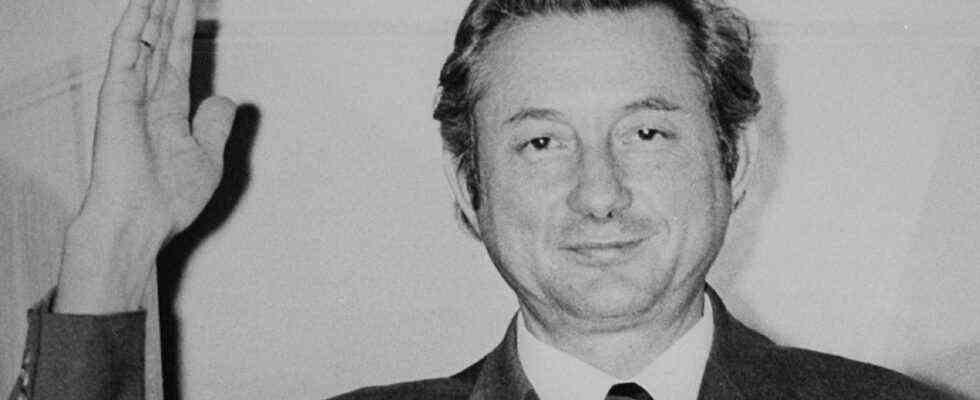The kidnapping of Aldi founder Theo Albrecht is one of the most spectacular German criminal cases. Fifty years ago today, the almost three-week war of nerves began.
It is the evening of November 29, 1971, 50 years ago today: At around 7 p.m., Theo Albrecht, then 49, left the headquarters of Aldi-Nord in Herten near Essen. Albrecht is very rich. Together with his brother Karl, Theo built up the Aldi discounter empire after the Second World War.
Karl directs Aldi-Süd from Mülheim, Theos Reich is Aldi-Nord with its headquarters in Herten. The brothers originally came from a humble background, but after the rapid expansion of Aldi in the early 1970s they were already more than wealthy, they were part of the German economic miracle.
This legendary wealth gave two criminals the idea of kidnapping – the two criminals are said to have learned from the book “The rich and super-rich in Germany” from the Albrecht brothers.
Theo Albrecht didn’t look like an Aldi founder at all
And so the then 47-year-old lawyer Heinz-Joachim Ollenburg and his 39-year-old accomplice Paul Kron lay in wait for their victim that evening in front of what was then Aldi-Nord headquarters.
But is this modest-looking man in his simple suit really the super-rich Aldi founder? It is said that Kron, a vault cracker with multiple criminal records and known in the underworld as “Diamond Paule”, first had Albrecht’s identity card shown to him. Because he wasn’t sure whether they really had Theo Albrecht in front of them – and perhaps not the company’s accountant after all.
By that evening, the kidnapper duo is said to have ambushed the victim several times without success. Initially, Theo’s older brother Karl is said to have been the target of the gangsters, but the criminals ultimately chose Theo Albrecht.
When they are sure that they have the real Aldi founder in front of them, the two kidnappers force him into a car at gunpoint and take him to Ollenburg’s office in the center of Düsseldorf.
The family of the Aldi founders does not want to speak publicly about the kidnapping to this day
The kidnapping is still considered one of the most spectacular criminal cases in German post-war history – and it was a deep turning point in the life of Theo Albrecht and the whole family. Even 50 years later, it is a burdensome issue for the discount dynasty. So traumatic that none of them like to speak about it publicly.
The DPA news agency, for example, tried to get a statement from one of Albrecht’s sons on the occasion of the 50th anniversary of the kidnapping. According to a company spokesman, he was 20 years old at the time. But the son refused, according to the agency.
Since the events of late autumn 1971, the billionaire clan has avoided the public as best they can. On the day of his release, Theo Albrecht said a few more sentences to reporters, cameras shot the last pictures of the entrepreneur for many years. Everyone in Germany knows Aldi, but the Albrecht brothers became very quiet after the end of 1971.
The hostage detention lasted almost three weeks – a total of 17 days – in those November and December days. Theo Albrecht is finally released in return for the payment of the almost unthinkable seven million marks ransom, the highest sum that has ever been paid in the Federal Republic to date.
17 days is a long time. The ransom negotiations with the kidnappers are tough, the gangsters get in touch by letter or phone. The money is finally delivered by the then Ruhr Bishop Franz Hengsbach.
The bishop agrees to hand over the millions in two suitcases on December 16 on a gloomy dirt road in Breitscheid near Düsseldorf. After the money has been handed over, Theo Albrecht remains in the care of the clergyman for 24 hours, this was agreed with the kidnappers. On December 17th, exactly one week before Christmas Eve, the Aldi founder can finally return to his family. He is – at least physically – unharmed.
Theo Albrecht thanks the police with champagne, beer and schnapps
The Essen police founded a special commission with more than 160 investigators for the largest manhunt to date in the Federal Republic. After his release, Albrecht thanked the officials with 120 bottles of sparkling wine, two barrels of beer and twelve bottles of schnapps. Albrecht is considered economical.
The perpetrators did not have much time to spend the immense amount of ransom. They were caught quickly. The handcuffs clicked for lawyer Ollenburg in Mexico, he is said to have returned his share of a good 3.5 million marks to Theo Albrecht.
Ollenburg’s accomplice made himself suspicious because he paid with 500 mark bills that came from the handover of the money. When he was arrested, he stated that he had only received 10,000 marks from Ollenburg. He doesn’t know where the rest of the money is. To date, around half of the millions of ransom money has been lost. For the kidnapping of Theo Albrecht, the two criminals were each sentenced to eight and a half years imprisonment by the Essen district court in 1973.
Is it possible to deduct ransom money from tax?
Theo Albrecht later made it into the headlines one more time. In 1979 he sued the Münster Finance Court because he wanted to deduct the ransom as a business expense, but was only partially successful.
Because the judges saw the kidnapping as a private matter. However, Albrecht was allowed to claim the missing part of the ransom as an extraordinary burden on the tax return.
Theo Albrecht died in 2010 at the age of 88, his brother Karl in 2014. The two kidnappers are no longer alive either. The case of Theo Albrecht’s kidnapping will probably never be forgotten – it is part of German criminal and economic history.
Sources: Archive of the star, “Berliner Morgenpost“, with material from dpa

See in the video: Customers buy from discounters because of the low prices. But does the bargain image also apply to employee pay? What does an employee at Aldi actually earn at the cash register?

